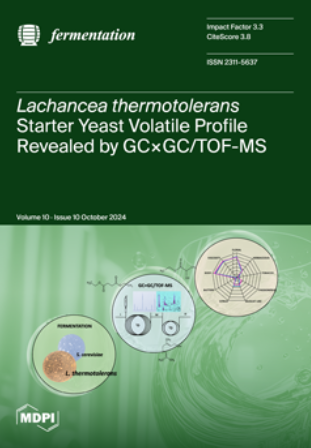利用代谢工程木醋杆菌生产传统塑料的潜在替代品
IF 3.3
3区 农林科学
Q2 BIOTECHNOLOGY & APPLIED MICROBIOLOGY
引用次数: 1
摘要
温室气体排放的增加和化石燃料供应的减少要求开发生产石油基商品的替代方法。塑料也是主要以石油为基础的产品,需求不断增长,因此人们对塑料替代品的兴趣越来越大。聚羟基烷酸酯(PHAs)是一种天然产生的生物聚合物,被微生物用作能量和碳储存的来源。聚3-羟基丁酸酯(PHB)是PHA家族的一员,被认为是最有希望取代聚乙烯(PE)的候选材料。PHB是由Cupriavidus necator自然产生的,但最近也建立了重组生产。本研究首次以CO2 + H2为碳源和能量源,研究了重组伍迪醋酸杆菌的异源生产PHB。引入合成PHB生产途径后,CDW的产量为1.23 g/L, PHB/细胞干重(CDW)为1.9%,相当于PHB的产量为23.5 mg/L。使用LipidGreen2荧光测量简化PHB定量。本文章由计算机程序翻译,如有差异,请以英文原文为准。
Production of Potential Substitutes for Conventional Plastics Using Metabolically Engineered Acetobacterium woodii
Increasing greenhouse gas emissions and decreasing fossil fuel supplies necessitate the development of alternative methods for producing petroleum-based commodities. Plastics are also primarily petroleum-based goods with rising demand, thus there is growing interest in plastic substitutes. Polyhydroxyalkanoates (PHAs) are naturally produced biopolymers that are utilized by microorganisms as a source of energy and carbon storage. Poly-3-hydroxybutyrate (PHB) is a member of the PHA family and is considered the most promising candidate to replace polyethylene (PE). PHB is naturally produced by Cupriavidus necator, but recombinant production has also been recently established. This study is the first to investigate the heterologous production of PHB with recombinant Acetobacterium woodii using CO2 + H2 as a carbon and energy source. The introduction of a synthetic PHB production pathway resulted in the production of 1.23 g/L CDW and 1.9% PHB/cell dry weight (CDW), which corresponds to a production of 23.5 mg/L PHB. PHB quantification was simplified using LipidGreen2 fluorescence measurements.
求助全文
通过发布文献求助,成功后即可免费获取论文全文。
去求助
来源期刊

Fermentation-Basel
BIOTECHNOLOGY & APPLIED MICROBIOLOGY-
CiteScore
3.80
自引率
18.90%
发文量
594
审稿时长
7 weeks
期刊介绍:
Fermentation-Basel is an international open access journal published by MDPI, focusing on fermentation-related research, including new and emerging products, processes and technologies, such as biopharmaceuticals and biotech drugs. The journal enjoys a good reputation in the academic community and provides a high-impact forum for researchers in the field of bioengineering and applied microbiology.
 求助内容:
求助内容: 应助结果提醒方式:
应助结果提醒方式:


